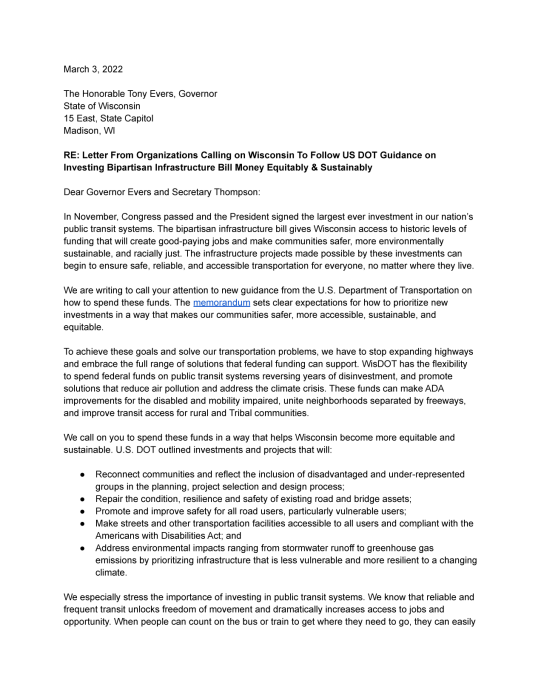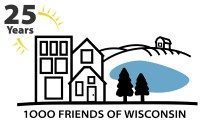Advocacy Update:
On March 3rd, 1000 Friends and 29 other organizations submitted a letter asking that WisDOT prioritize discretionary infrastructure funding to projects that promote equity and sustainability. These goals are laid out in a new US DOT memorandum, which we would like WisDOT to use when deciding which projects to fund.
To achieve the administration’s climate goals and solve our transportation problems, Wisconsin has to stop expanding highways and embrace the full range of solutions that federal funding can support. WisDOT has the flexibility to spend federal funds on public transit systems reversing years of disinvestment and promote solutions that reduce air pollution and address the climate crisis. The text of the letter can be found below.

Full Text:
RE: Letter From Organizations Calling on Wisconsin To Follow US DOT Guidance on Investing Bipartisan Infrastructure Bill Money Equitably & Sustainably
Dear Governor Evers and Secretary Thompson:
In November, Congress passed and the President signed the largest ever investment in our nation’s public transit systems. The bipartisan infrastructure bill gives Wisconsin access to historic levels of funding that will create good-paying jobs and make communities safer, more environmentally sustainable, and racially just. The infrastructure projects made possible by these investments can begin to ensure safe, reliable, and accessible transportation for everyone, no matter where they live.
We are writing to call your attention to new guidance from the U.S. Department of Transportation on how to spend these funds. The memorandum sets clear expectations for how to prioritize new investments in a way that makes our communities safer, more accessible, sustainable, and equitable.
To achieve these goals and solve our transportation problems, we have to stop expanding highways and embrace the full range of solutions that federal funding can support. WisDOT has the flexibility to spend federal funds on public transit systems reversing years of disinvestment, and promote solutions that reduce air pollution and address the climate crisis. These funds can make ADA improvements for the disabled and mobility impaired, unite neighborhoods separated by freeways, and improve transit access for rural and Tribal communities.
We call on you to spend these funds in a way that helps Wisconsin become more equitable and sustainable. U.S. DOT outlined investments and projects that will:
- Reconnect communities and reflect the inclusion of disadvantaged and under-represented groups in the planning, project selection and design process;
- Repair the condition, resilience and safety of existing road and bridge assets;
- Promote and improve safety for all road users, particularly vulnerable users;
- Make streets and other transportation facilities accessible to all users and compliant with the Americans with Disabilities Act; and
- Address environmental impacts ranging from stormwater runoff to greenhouse gas emissions by prioritizing infrastructure that is less vulnerable and more resilient to a changing climate.
We especially stress the importance of investing in public transit systems. We know that reliable and frequent transit unlocks freedom of movement and dramatically increases access to jobs and opportunity. When people can count on the bus or train to get where they need to go, they can easily access jobs, education, medical care, culture, goods and services, and the daily life of their communities. They benefit from greater economic mobility and lower household costs. Transportation systems that maximize people’s access to good transit are necessarily inclusive, without barriers linked to race, income, age, or ability. And because transit is resource-efficient and supports low-emissions neighborhoods, it’s also an indispensable tool to prevent climate change, clean our air, and protect public health.
Today our transportation systems fall short of what’s needed to build healthy, thriving, economically resilient communities. The Environmental Protection Agency reports that “Greenhouse gas (GHG) emissions from transportation accounts for about 29% of total U.S. greenhouse gas emissions, making it the largest contributor of U.S. GHG emissions.” Racial bias and neglect in historical transportation policy built freeways carrying fossil fuel-emitting cars and trucks through historically marginalized neighborhoods. This perpetuates racial and income inequality, limits economic opportunity, hastens catastrophic climate change, and exacerbates chronic disease, adding to disparate health outcomes for those communities.
You have an historic opportunity to change the status quo of transportation planning to build good public transit systems that meet the needs of the communities they serve. Wisconsinites of all types, including urban and rural residents, need transit that is:
- Equitable. America’s car-based transportation system erects barriers to mobility that reinforce long term social inequities. Investments should remove these barriers and prioritize the needs of People of Color, people with low incomes, and people with disabilities.
- Sustainable. The transportation sector is the number one emitter of greenhouse gases in the U.S. To avert severe climate change, public transit use must increase. Investments should expand access to good bus and train service.
- Economically productive. As cities and rural communities alike recover from the pandemic, ensuring people have safe and reliable ways to get to work, school, and shopping is critical. Investments should make service more abundant, frequent, fast, and reliable to increase economic opportunity and productivity.
- Safe and accessible. Many factors in addition to scarce service limit access to transit, including dangerous streets, discriminatory policing, and the lack of elevators at stations. Investments should eliminate the full range of limitations and achieve broad-based safety and universal access.
- Affordable. Access to transit should never be contingent on one’s ability to pay. Investments should establish programs that provide fare relief for everyone who needs it.
As you create your plans to spend infrastructure funding for the coming years, we strongly urge you to follow the U.S. Department of Transportation’s guidance for investing these new federal dollars to build better public transit and a transportation system that works for all Wisconsinites.
Sincerely,
Gregg May, 1000 Friends of Wisconsin
Terry Wiggins, 350.org – Milwaukee
Christine Donahoe, ACLU of Wisconsin
Jeremy Gragert, Bike Chippewa Valley
Chippewa Valley Transit Alliance
Ted Kraig, Citizen Action of Wisconsin
Chelsea Chandler, Clean Wisconsin
Nino Amato, Coalition of Wisconsin Aging & Health Groups
Gary Crevier, ESTHER
Leland Pan, Friends of Valley Park
Greater WI Agency on Aging Resources, Inc. (GWAAR)
Michele Mackey, Kids Forward
Cathy Van Maren, La Crosse Area Transit Advocates
Dennis Grzezinski, Law Office of Dennis M Grzezinski
Susan De Vos, Madison Area Bus Advocates
Rev. Joseph Jackson, MICAH
Cheryl Nenn, Milwaukee Riverkeeper
Wendell J. Harris, NAACP – Wisconsin State Conference
Heather Allen, RENEW Wisconsin
Allison Werner, River Alliance of Wisconsin
Jenny Abel, Sierra Club – Great Waters Group
Cassie Steiner, Sierra Club – Wisconsin Chapter
Kirsten Finn, Wisconsin Bike Federation
Wisconsin Coalition Against Sexual Assault
Jennifer Giegerich, Wisconsin Conservation Voters
Wisconsin Council of the Blind & Visually Impaired
Wisconsin Faith Voices for Justice
Abby Novinska-Lois, Wisconsin Health Professionals for Climate Action
Nick DeMarsh, Wisconsin Transit Riders Alliance, Milwaukee Transit Riders Union
David Liners, WISDOM
